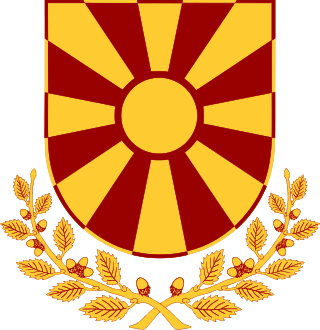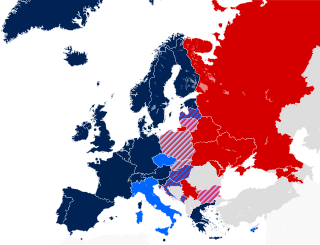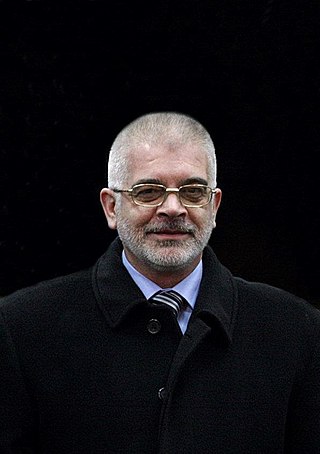| Part of the LGBT rights series | ||
Recognized
| ||
Civil unions and registered partnerships
| ||
See also
| ||
Notes
| ||
| | ||
North Macedonia does not recognize same-sex marriages or civil unions. A constitutional amendment to ban same-sex marriage failed in 2015.
| Part of the LGBT rights series |
| |
North Macedonia does not recognize same-sex marriages or civil unions. A constitutional amendment to ban same-sex marriage failed in 2015.
North Macedonia does not recognize civil unions (Macedonian : граѓанско партнерство, [1] graǵansko partnerstvo, pronounced [ˈɡraɟanskɔˈpartnɛrstvɔ] ; Albanian : bashkim civil, pronounced [baʃˈkimtsiˈvil] ) [lower-alpha 1] which would offer same-sex couples a subset of the rights, benefits and responsibilities of marriage. However, North Macedonia is obliged under the European Court of Human Rights' ruling in Fedotova and Others v. Russia to provide legal recognition to same-sex unions. In January 2023, the Grand Chamber ruled that Article 8 of the European Convention on Human Rights, which guarantees a right to private and family life, places a positive obligation on all member states of the Council of Europe to recognize same-sex partnerships. [4]

There is no legal recognition of same-sex relationships in North Macedonia. The Law on Family (Macedonian : Закон за семејството, [5] Zakon za semejstvoto; Albanian : Ligji për familjen) defines marriage as "a living community of a man and a woman regulated by law." [6] Article 15 of the Law on Family also states that "a marriage may be stipulated by two persons of different gender with a freely expressed will before a competent authority, in a manner stipulated by this law." [7]
The Constitution of North Macedonia does not expressly prohibit same-sex marriages. Article 40 states: [8]
The legal relations in marriage, the family and cohabitation are regulated by law. [lower-alpha 2]
In September 2013, a proposed constitutional amendment to define marriage as a union between "a man and a woman" failed to meet the required two-thirds majority in the Assembly of North Macedonia. [11]
In late June 2014, the re-elected ruling party, VMRO-DPMNE, once again submitted a bill, this time hoping that the Democratic Party of Albanians (DPA) would provide the additional votes needed to pass it. [12] On 9 January 2015, the parliamentary committee on constitutional issues approved the amendment prohibiting same-sex marriage. On 20 January, the amendment was approved in Parliament by 72 votes to 4. [13] "Today's vote is another addition to discrimination, violence and intolerance on the basis of sexual orientation or gender identity in Macedonia.", said a spokesman for Amnesty International. [14] A final vote was required for the amendment to be added to the Constitution. This final parliamentary session was commenced on 26 January but never concluded, as the ruling coalition did not obtain the two-thirds majority required. Eventually, the amendment failed, and the Constitution was not modified to prohibit same-sex marriages. [15]
A 2015 National Democratic Institute (NDI) poll showed that 2% of Macedonians considered same-sex marriages "completely acceptable" and 7% considered it "mainly acceptable", while 89% of respondents considered it "unacceptable" (11% "mainly unacceptable" and 78% "completely unacceptable"). [16]

"Denes nad Makedonija" is the national anthem of North Macedonia. Todor Skalovski composed the music and Vlado Maleski wrote the lyrics of the song in the early 1940s. It was adopted as the national anthem in 1992, almost a year after the state's independence from Yugoslavia. Before its adoption as a national anthem, it was used as the regional anthem of the Socialist Republic of Macedonia, a constituent state of Yugoslavia, before it became the national anthem of the Republic of North Macedonia.
Romania does not allow same-sex marriage or civil unions. In June 2018, the European Court of Justice ruled that under certain circumstances same-sex spouses of European Union citizens should be granted a right of residency in Romania. The Constitution of Romania does not define marriage directly, but Article 48 of the Constitution defines marriages between "spouses" as the foundation of the family.

The president of the Republic of North Macedonia is the head of state of North Macedonia.

Croatia recognizes life partnerships for same-sex couples through the Life Partnership Act, making same-sex couples equal to married couples in almost all of its aspects. The Act also recognizes and defines unregistered same-sex relationships as informal life partners, thus making them equal to registered life partnerships after they have been cohabiting for a minimum of 3 years. Croatia first recognized same-sex couples in 2003 through a law on unregistered same-sex unions, which was later replaced by the Life Partnership Act. The Croatian Parliament passed the new law on 15 July 2014, taking effect in two stages. Following a 2013 referendum, the Constitution of Croatia has limited marriage to opposite-sex couples.

Lesbian, gay, bisexual, and transgender (LGBT) people in Bulgaria face significant challenges not experienced by non-LGBT residents. Both male and female same-sex relationships are legal in Bulgaria, but same-sex couples and households headed by same-sex couples are not eligible for the same legal protections available to opposite-sex couples. Discrimination on the basis of sexual orientation has been banned since 2004, with discrimination based on "gender change" being outlawed since 2015. In July 2019, a Bulgarian court recognized a same-sex marriage performed in France in a landmark ruling. For 2020, Bulgaria was ranked 37 of 49 European countries for LGBT rights protection by ILGA-Europe. Like most countries in Central and Eastern Europe, post-Communist Bulgaria holds socially conservative attitudes when it comes to such matters as homosexuality and transgender people.

Lesbian, gay, bisexual, and transgender (LGBT) people in Albania face legal challenges not experienced by non-LGBT residents, although LGBT people are protected under comprehensive anti-discrimination legislation. Both male and female same-gender sexual activities have been legal in Albania since 1995, but households headed by same-sex couples are not eligible for the same legal protections available to opposite-gender couples, with same-sex unions not being recognized in the country in any form.

Lesbian, gay, bisexual, and transgender (LGBT) rights are widely diverse in Europe per country. 22 of the 38 countries that have legalised same-sex marriage worldwide are situated in Europe. A further 11 European countries have legalised civil unions or other forms of more limited recognition for same-sex couples.

The official language of North Macedonia is Macedonian, while Albanian has co-official status. Macedonian is spoken by roughly two-thirds of the population natively, and as a second language by much of the rest of the population. Albanian is the largest minority language. There are a further five national minority languages: Turkish, Romani, Serbian, Bosnian, and Aromanian. The Macedonian Sign Language is the country's official sign language.

The Constitution of the Republic of North Macedonia is a codified constitution outlining North Macedonia's system of government and basic human rights. It was adopted in the Parliament of the then-Republic of Macedonia on 17 November 1991.

Lesbian, gay, bisexual, and transgender (LGBT) rights in Kosovo have improved in recent years, most notably with the adoption of the new Constitution, banning discrimination based on sexual orientation. Kosovo remains one of the few Muslim-majority countries that hold regular pride parades.

Law enforcement in North Macedonia is the responsibility of the Police of the Republic of North Macedonia.
Bulgaria does not recognize same-sex marriage or civil unions. Though these issues have been discussed frequently over the past few years, no law on the matter has passed the National Assembly. In September 2023, the European Court of Human Rights ordered the government to establish a legal framework recognizing same-sex unions.
Serbia does not recognize any form of legal recognition for same-sex couples. Same-sex marriage is banned under the Constitution of Serbia adopted in 2006. However, there have been discussions in the National Assembly to legalize civil unions.
Albania does not recognize same-sex marriages or civil unions. A bill to legalize same-sex marriage had been introduced to Parliament in 2009 with the support of Prime Minister Sali Berisha, but was never voted on.
Montenegro has recognised same-sex unions since 15 July 2021. In July 2020, the Parliament of Montenegro passed a bill, by 42 votes to 5, to recognise life partnerships for same-sex couples offering several, but not all, of the rights and benefits of marriage. The bill was signed into law on 3 July 2020 by President Milo Đukanović and took effect on 15 July 2021.
Ukraine does not recognize same-sex marriage or civil unions. The Constitution of Ukraine defines marriage as between "a woman and a man". The issue of legal recognition for same-sex couples has become particularly acute after the start of Ukraine's accession to the European Union in 2022 and the Russian large-scale invasion of Ukraine during the Russo-Ukrainian War.

Todor Petrov is the president of the Macedonian diaspora organisation World Macedonian Congress (WMC). Petrov is a councillor in the electorate of Gazi Baba.

Lesbian, gay, bisexual, and transgender (LGBT) people in North Macedonia face discrimination and some legal and social challenges not experienced by non-LGBT residents. Both male and female same-sex sexual activity have been legal in North Macedonia since 1996, but same-sex couples and households headed by same-sex couples are not eligible for the same legal protections available to opposite-sex married couples.
Storming of the Macedonian Parliament, also known as Bloody Thursday occurred on 27 April 2017, when about 200 Macedonian nationalists stormed the Macedonian Parliament in reaction to the election of Talat Xhaferi, an ethnic Albanian, as Speaker of the Assembly of the Republic of Macedonia. It was the biggest attack in history on a Macedonian institution.

The Left is a left-wing nationalist and eurosceptic political party in North Macedonia founded on 14 November 2015. Led by Dimitar Apasiev, a Docent of Law at the Goce Delčev University of Štip, the party is anti-NATO and promotes anti-clericalism, anti-fascism, anti-imperialism, and socialism, sitting on the left wing of the political spectrum.